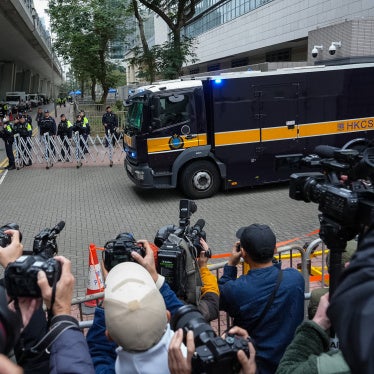Human Rights Watch today welcomed the first successful prosecution by an East Timorese court of a militia member, but said real justice for East Timor was a long way off.
A court set up by the United Nations Transitional Administration in East Timor (UNTAET) sentenced Joao Fernandes, 22, to twelve years in prison on Thursday. The three judges on the panel were from East Timor, Italy, and Burundi. Fernandes, a member of the Dadurus Merah Putih militia, admitted to having murdered a village chief who had sought refuge in the police station in Maliana, near the West Timor border, in early September 1999. Some forty people were subsequently massacred in the police station.
"This trial is important because it means the courts are finally functioning, and the backlog of cases is finally being cleared," said Joe Saunders, deputy Asia director for Human Rights Watch. "But all the key perpetrators of the 1999 violence remain in Indonesia, and prosecutions there are totally stalled."
In East Timor, some fifty mostly low-ranking militia members have been detained, some for more than a year. It has been a source of great frustration inside East Timor that justice has proceeded so slowly. The courts had to be created from scratch last year, and the investigation process has been plagued by inadequate training of investigators, changes in administrative structure, and lack of resources and personnel.
Saunders pointed out that Fernandes was sentenced on ordinary murder charges, not crimes against humanity. In order to make a case for the latter, Dili-based investigators need to prove that the 1999 violence was part of a larger plan or policy, and critical evidence rests with witnesses on the Indonesian side of the border.
Major obstacles remain to justice in Indonesian courts. While it announced a list of suspects on September 1, 1999, the Indonesian government has made no move to issue indictments against them, let alone arrest warrants. A key militia leader, Eurico Gutteres, is on trial in Jakarta, but on charges that have nothing to do with the 1999 violence. He has been embraced as a hero of national unity by several leading Jakarta politicians.
Moreover, the Indonesian Attorney-General's office has said that it will not proceed with indictments until an "ad hoc" human rights court is set up under legislation passed last November. For those courts to be established, the Indonesian parliament must make a formal request to the president, and it shows no inclination to do so.
"There has been no evidence -- in either Jakarta or Dili -- of a systematic strategy to prosecute the top militia commanders or the Indonesian officers behind them," Saunders said.
He noted that January 31, 2001 marks the first anniversary of a report by an international commission of inquiry on East Timor, appointed by the U.N. High Commissioner for Human Rights, that called for an international tribunal to prosecute likely crimes against humanity. Secretary-General Kofi Annan, on receiving the report, said the Indonesian investigative process should be given a chance to work first.
"Since investigations in Jakarta are clearly going nowhere, the international community should begin serious preparations for an international tribunal," said Saunders. "This should include a timetable and process for establishing such a tribunal absent clear progress in Indonesia."







